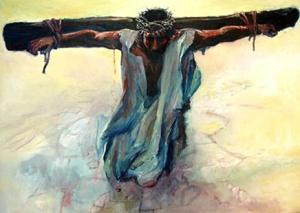"A Crucified God"Throughout the year, the Southern New England Conference of the United Church of Christ produces the Daily Lectionary for use by churches. These are the suggested readings for Thursday, March 12th: Exodus 16:1-8; Psalm 95; and Colossians 1:15-23. I would encourage you to read these short selections as part of your Lenten practice.
Do you ever really stop to think about what Jesus’ crucifixion means? Christians have been pondering this for millennia. It has resulted in people being kicked out of the church for choosing the wrong answer, for heresy. Some taught that it only seemed like Jesus suffered and died, that it was impossible for the Christ, even the Son of God, to experience such things. At the other end of the spectrum, there were those who taught that when Jesus suffered and died, God Himself experienced suffering and death. Every once in a while, I am blessed by a book that clarifies or changes my thinking in extraordinary ways. One such book is Jurgen Moltmann’s The Crucified God. Moltmann argues that Jesus’ death did affect God, changed God. He holds that if God willed that He be able to experience everything that Jesus experienced, including the cross, then this was well within the boundaries of orthodox Christian thought. Suffering and death for you and me are forced upon us. For God, however, they are experiences that He allows. As Christians, we believe that Jesus is God incarnate, which means in the words of today’s passage from Colossians that “… in him all the fullness of God was pleased to dwell.” Moltmann’s stance is that if this is our belief, why would we assume that it ends or is somehow isolated on Good Friday. If the whole holy purpose of Jesus is that God has become us, then Jesus’ real human suffering and death are experienced by God. How could it then be possible that the experience of the cross would not change the nature of God? Moltmann distances himself from the confines of ancient Greek philosophy, which insisted that the perfect is eternally unchanging. Instead, relying more on the Hebraic idea of the divine, Moltman argues that if God allows it, then change in His nature is not heretical. It is actually an attribute of God’s vitality. If you can accept this position, then the cross means that God endures suffering and death, that the connection between God and us in Christ is complete, and as Colossians says today, “… and through [Jesus] God was pleased to reconcile to himself all things, whether on earth or in heaven, by making peace through the blood of his cross.” God in Christ knows how hard life is. Our God does not watch from an antiseptic distance. Our God reconciles us to Himself by choosing in Christ to experience the fullness of the human condition, good and bad. For me, this is the extraordinary nature of Christianity that binds me to God. It is not atonement for sin. It is at-one-ment in Christ. What kind of perfect God accepts something like the cross? What kind of love is this? What sort of compassion and empathy? Who is this Jesus who brings God into our world as us? These are questions to consider as we walk our Lenten journey.
0 Comments
Leave a Reply. |
NewsFaith, love and chitchat. Categories
All
Archives
June 2024
Follow
|
|
SERVICE TIMES
Sunday 9:30-10:30am Children Sunday School 9:30-10:30am Nursery care available during worship DONATE Make a single or recurring contribution by clicking here |
FOLLOW
|

 RSS Feed
RSS Feed
